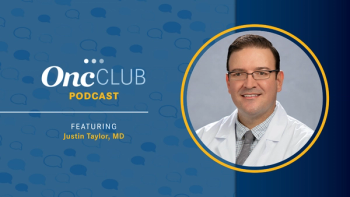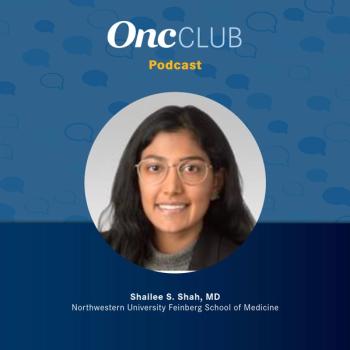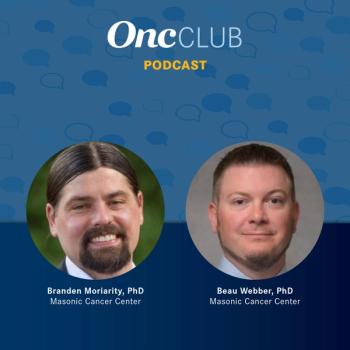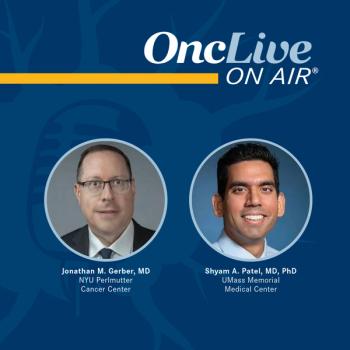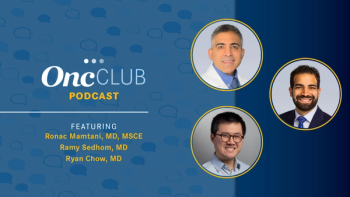
Bou Farhat and Nassar on the Use of NGS Mutation Signature vs IHC for Identifying dMMR Tumors

Drs Nassar and Bou Farhat explain how tumor-only NGS could address the limitations of IHC testing for MMR mutation signatures across several tumor types.
Welcome to OncLive On Air®! I’m your host today, Courtney Flaherty.
OncLive On Air is a podcast from OncLive®, which provides oncology professionals with the resources and information they need to provide the best patient care. In both digital and print formats, OncLive covers every angle of oncology practice, from new technology to treatment advances to important regulatory decisions.
In today’s episode, we had the pleasure of speaking with Amin Nassar, MD, and Elias Bou Farhat, MD, regarding their evaluation of the feasibility and accuracy of using next-generation sequencing (NGS) mutation signature for assessing and identifying mismatch repair–deficient (dMMR) tumors compared with standard MMR immunohistochemistry (IHC) testing. Dr Nassar is a hematology/oncology fellow at Yale University in New Haven, Connecticut. Dr Bou Farhat is a postdoctoral research fellow in the Department of Medicine at Brigham and Women’s Hospital in Boston, Massachusetts.
The retrospective study found that an additional 6.9% of patients with dMMR colorectal or endometrial cancer that were missed by IHC but detected by NGS-based mutation signature (NGS/IHC discordant) experienced comparable clinical outcomes to those of patients identified as dMMR by both IHC and mutation signature (NGS/IHC concordant) across tumor types. Moreover, improvements in overall survival (OS) and time to treatment failure were observed in the discordant group vs those with concordant MMR-proficient (pMMR) tumors. The median OS was also prolonged in patients with discordant CRC or endometrial tumors who received immune checkpoint inhibitors vs those who were not previously exposed to checkpoint inhibitors and received other systemic therapies.
Ultimately, investigators concluded that tumor-only NGS demonstrated high sensitivity for detecting MMR signature analysis in patients with CRC or endometrial cancer and could be employed as a complementary test alongside IHC to improve the identification of patients who may benefit from immunotherapy.
In our exclusive interview, Drs Nassar and Bou Farhat explained how tumor-only NGS could address the limitations of IHC testing for MMR mutation signatures across several tumor types, discussed primary findings and concordance rates from the study, and proposed revisiting guideline recommendation on diagnostic testing to reduce the impact of misdiagnosis of MMR status on treatment outcomes.
___
That’s all we have for today! Thank you for listening to this episode of OncLive On Air. Check back on Mondays and Thursdays for exclusive interviews with leading experts in the oncology field.
For more updates in oncology, be sure to visit www.OncLive.com and sign up for our e-newsletters.
OncLive® is also on social media. On Twitter, follow us at @OncLive. On Facebook, like us at OncLive, and follow our OncLive page on LinkedIn.
If you liked today’s episode of OncLive On Air, please consider subscribing to our podcast on Apple Podcasts, Spotify, Google Podcasts, Amazon Music, and many of your other favorite podcast platforms,* so you get a notification every time a new episode is posted. While you are there, please take a moment to rate us!
Thanks again for listening to OncLive On Air.
*OncLive On Air is available on: Apple Podcasts, Google Podcasts, Spotify, Amazon Music, Audacy, CastBox, Deezer, iHeart, JioSaavn, Listen Notes, Player FM, Podcast Addict, Podchaser, RadioPublic, and TuneIn.


